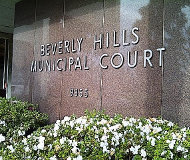11/25/2013
California: Court Rejects Confrontation Argument Against CamerasAppellate decision in California denies motorists the right to confront the private company that generates red light camera tickets.

Forget fighting a red light camera ticket with a Confrontation Clause argument in Beverly Hills, California. A three-judge panel of the Superior Court's appellate division in July upheld the citation issued to motorist Tayo Popoola, denying his argument that he was unable to confront the real witness against him, the private, for-profit firm Affiliated Computer Services (ACS, now Xerox).
An ACS camera photographed Popoola's car as it went through the intersection at Beverly Boulevard and Robertson Boulevard in West Hollywood on November 1, 2011 after the light allegedly had been red for 0.3 seconds, which is the average amount of time it takes for an eye to blink. Popoola argued to the Beverly Hills trial court that he had a right to cross-examine the ACS personnel who owned and operated the cameras that accused him.
Los Angeles Sheriff's Department Deputy Zenon Porche testified that he was qualified to do so because he has helped certify 200,000 automated tickets -- about $50 million worth -- since 1999. ACS performs three maintenance checks a month and Deputy Porche confirms the maintenance logs produced by the company. Twice per month, Deputy Porche inspects each camera intersection himself.
At issue is the applicability of the US Supreme Court decision Melendez-Diaz v. Massachusetts which held that the technicians who issue certificates of analysis for evidence must appear as witnesses in a trial under the Sixth Amendment. The 2011 case Bullcoming v. New Mexico applied the issue to a drunk-driving case.
"Suppose a police report recorded an objective fact -- Bullcoming's counsel posited the address above the front door of a house or the read-out of a radar gun," Justice Ruth Bader Ginsburg wrote for the majority in 2011. "Could an officer other than the one who saw the number on the house or gun present the information in court -- so long as that officer was equipped to testify about any technology the observing officer deployed and the police department's standard operating procedures? As our precedent makes plain, the answer is emphatically 'No.'"
The appellate judges in Los Angeles County distinguished the breath readings, radar gun readouts and lab results as "testimonial" evidence distinct from the generalized information on the data bar of a red light camera photo that shows the yellow timing, time and date, and how long the light had been red at the time of the alleged violation.
"At the time the information in the data bar was gathered by the automated red light enforcement system, the driver of the vehicle had not yet been identified," Judge Patti Jo McKay wrote for the court. "Furthermore, there is nothing to show that the information in the data bar was formalized in any manner. As such, the automated red light enforcement system evidence did not implicate defendant's Sixth Amendment rights."
The court affirmed the judgment of Popoola's guilt and confirmed the $500 fine, noting that Deputy Porche had personal knowledge regarding the issues about which he testified.
A copy of the decision is available in a 1.2mb PDF file at the source link below.


